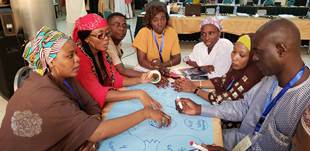Since 2017, UNESCO has been working with the Lake Chad Basin Commission (LCBC) to implement the BIOPALT project (BIOsphere and Heritage of Lake Chad), aimed at promoting a multidisciplinary approach to sustainably managing and protecting the natural resources, culture and livelihoods of the Lake Chad and its people. The project focuses on five Lake Chad Basin countries: Cameroon, Central Africa Republic, Chad Niger, and Nigeria.
Under the framework of BIOPALT, IHP developed an improved Flood and Drought Monitoring System for Lake Chad Basin Countries, based on the continental African Flood and Drought Monitor. The system provides historic surface water conditions and associated flood and drought indices at 5km and daily resolution for 1979-2016 using a combination of existing datasets used in the operational AFDM and newly available datasets, such as for Multi-Source Weighted-Ensemble Precipitation.
IHP’s work in the Lake Chad Basin also included activities to promote peaceful management of water resources among Basin stakeholders. In September and October 2019, UNESCO organised regional, national and community level training of trainer workshops on water diplomacy in in Abuja and Maiduguri, Nigeria and Maroua, Cameroon to build capacity and understanding of hydropolitics in transboundary waters, negotiation and communication skills, and international water law. The training targeted key national water managers, community leaders and representatives from the LCBC, among others. More than 100 persons have been trained to date. Similar workshops will continue take place in 2020 in the Central African Republic, Chad and Niger.

Participants in the Lake Chad Regional Training of Trainers Workshop discuss conflict management techniques, Abuja, Nigeria. Credit: R. Gift